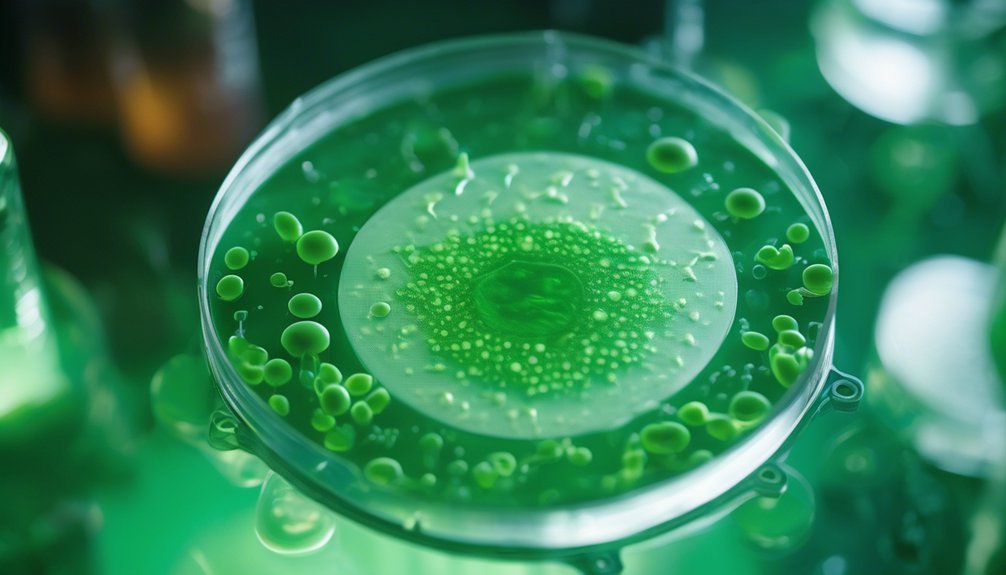Maintaining a healthy gut is more than just a trendy wellness focus; it could be a key player in your cancer prevention strategy. The intricate relationship between your gut microbiome and cancer development is a topic of growing interest among researchers and health professionals. Understanding how gut health impacts cancer risk and treatment outcomes could reshape the way we approach cancer prevention and management. The connection between your gut and cancer is a complex web worth exploring further.
Key Takeaways
- Gut microbiota imbalance can promote inflammation, increasing cancer risk.
- A diverse microbiota composition can prevent gut inflammation and lower cancer risk.
- Impaired gut barrier integrity can lead to chronic inflammation, promoting tumor growth.
- Certain gut bacteria influence immunity, impacting cancer development.
- Probiotics support a healthy gut environment and may aid in cancer prevention.
Importance of Gut Microbiome
Examining the intricate ecosystem within your gut, known as the gut microbiome, reveals a complex network of trillions of microorganisms that play a crucial role in your overall health. The gut microbiome isn't just a collection of bacteria; it's a dynamic community that influences various aspects of your well-being.
One key aspect is the gut-brain connection, where signals between the gut and the brain impact mood, cognition, and even behavior.
Another critical factor is gut flora diversity, which refers to the variety of microorganisms residing in your gut. A diverse gut flora is essential for maintaining a healthy gut environment and supporting proper digestion and nutrient absorption. Research indicates that a lack of diversity in gut flora is linked to various health issues, including inflammatory conditions and metabolic disorders.
Understanding the importance of a balanced gut microbiome, characterized by a strong gut-brain connection and diverse gut flora, is crucial for optimizing your health and well-being. By nurturing a healthy gut ecosystem, you can support your body in warding off diseases and promoting overall wellness.
Gut Health and Inflammation
Exploring the intricate network of microorganisms in your gut, it becomes evident that gut health is closely intertwined with the inflammatory response in your body. Gut inflammation plays a significant role in promoting cancer due to its impact on the immune response.
When the delicate balance of the gut microbiome is disrupted, it can lead to chronic inflammation. This persistent inflammation creates an environment where cancer cells can thrive, evade the immune system, and spread more easily.
Research has shown that gut health influences the immune response, affecting the body's ability to combat cancer cells. The gut microbiota can interact with the immune cells in the gut lining, influencing their behavior and response to inflammation.
Imbalances in the gut microbiota can trigger an inflammatory cascade, contributing to the development and progression of cancer.
Therefore, maintaining a healthy gut through a balanced diet, probiotics, and lifestyle choices is crucial in preventing gut inflammation and reducing the risk of cancer promotion. By supporting your gut health, you're also supporting a strong immune response against cancerous cells.
Microbiota Diversity and Cancer Risk
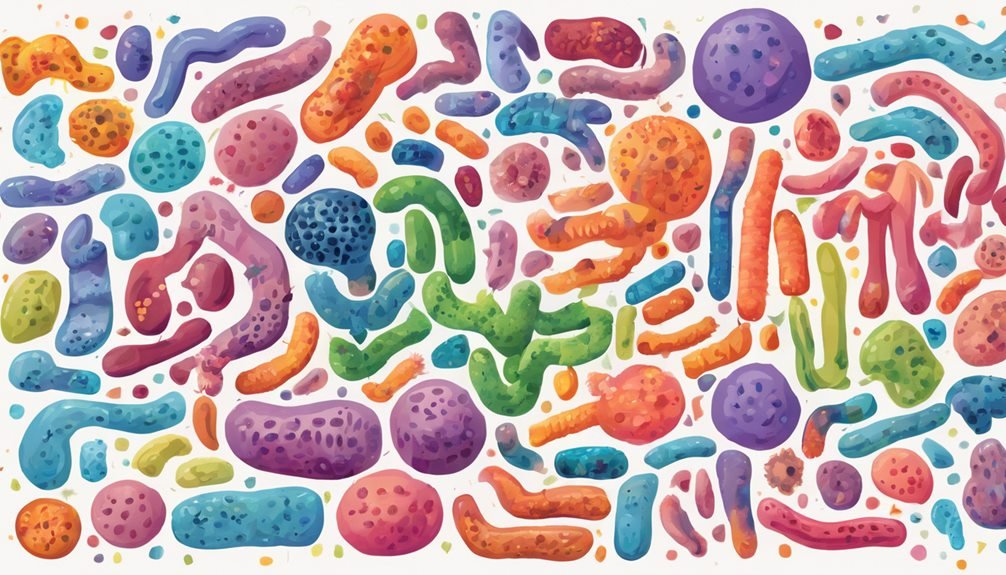
The diversity of microbiota in your gut plays a pivotal role in influencing your risk of developing cancer. Research indicates that a balanced microbiota composition is essential for maintaining a healthy gut environment and reducing the likelihood of cancer progression. Various studies have shown that alterations in the diversity of gut microbiota can lead to an increased risk of certain types of cancer, including colorectal cancer.
A diverse microbiota composition helps in maintaining a robust immune system, which is crucial for identifying and destroying potential cancerous cells. Moreover, certain beneficial bacteria in the gut can also produce compounds that have anti-cancer properties, further reducing the risk of cancer development.
On the other hand, a lack of microbiota diversity or an imbalance in the composition can create an environment conducive to inflammation and other factors that promote cancer progression.
Therefore, focusing on promoting a diverse and balanced microbiota composition through a healthy diet rich in fiber, fermented foods, and probiotics can significantly lower your risk of cancer.
Gut Permeability and Cancer Development
Recent research has shed light on the significant role of gut permeability in the development of cancer. The gut barrier, responsible for controlling the passage of molecules from the intestines into the bloodstream, plays a crucial role in maintaining overall health. When this barrier is compromised, it can lead to increased permeability, allowing harmful substances to enter the bloodstream and potentially trigger inflammation and other negative effects that contribute to tumor progression.
To emphasize the impact of gut permeability on cancer development, consider the following table:
| Aspect | Importance |
|---|---|
| Gut Barrier Integrity | Crucial for preventing harmful substances from entering the bloodstream |
| Inflammation | Increased permeability can lead to chronic inflammation, promoting tumor growth |
| Immune Response | Impaired gut barrier can weaken immune response against cancer cells |
| Toxins Absorption | Higher permeability may allow toxins to be absorbed, further fueling tumor progression |
| Treatment Strategies | Targeting gut barrier integrity may be a novel approach in cancer therapy |
Understanding the intricate relationship between gut permeability and cancer development is essential in developing effective prevention and treatment strategies.
Influence of Gut Bacteria on Immunity
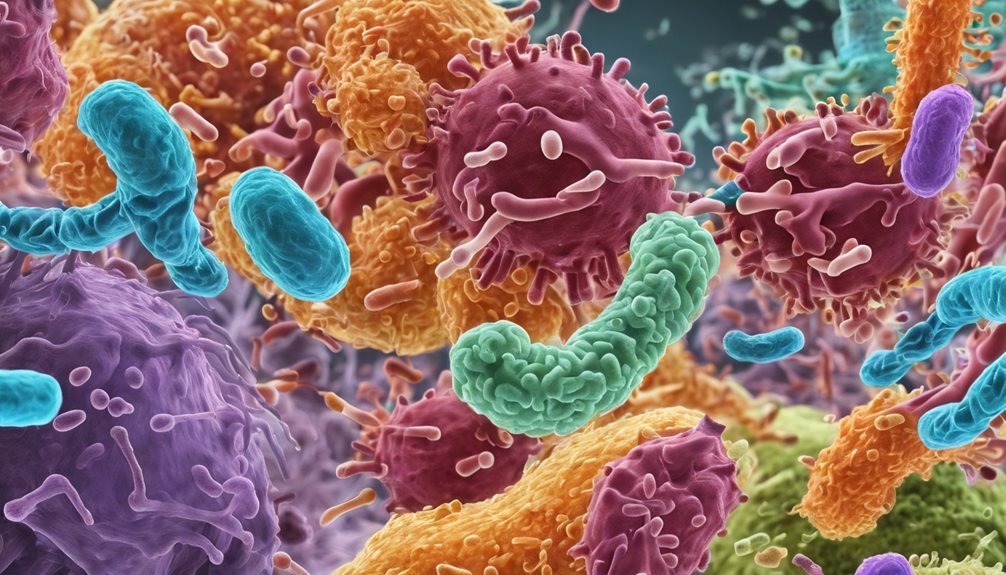
Research has increasingly highlighted the profound influence of gut bacteria on the immune system, underscoring the intricate interplay between the microbiome and immune response. Understanding the role of gut bacteria in immune modulation is crucial for maintaining overall health.
Here are four key ways gut bacteria influence immunity:
- Regulating Inflammation: Gut bacteria play a significant role in balancing the immune response, helping to prevent chronic inflammation that can contribute to various diseases, including cancer.
- Enhancing Immune Response: Certain gut bacteria can stimulate immune cells, improving the body's ability to fight off infections and diseases, ultimately supporting overall immune function.
- Supporting the Gut-Brain Axis: The gut-brain axis is a bidirectional communication system between the gut and the brain, where gut bacteria play a vital role in influencing mood, cognition, and immune responses.
- Maintaining Immune Homeostasis: Gut bacteria help in maintaining a balanced immune system, crucial for preventing autoimmune diseases and promoting overall well-being. Understanding the intricate relationship between gut bacteria and immunity is essential for optimal health.
Gut Microbiome and Anti-Cancer Responses
Building upon the profound impact of gut bacteria on immunity discussed previously, the intricate relationship between the gut microbiome and anti-cancer responses is a subject of growing interest in the scientific community. Research has shown that the gut microbiome plays a crucial role in influencing anti-cancer responses through various mechanisms.
One key aspect is the synergy between the gut microbiome and immunotherapy, where specific gut bacteria can enhance the effectiveness of cancer immunotherapy treatments.
Furthermore, studies have highlighted the connection between gut bacteria and tumor progression. Certain bacteria within the gut microbiome have been found to either promote or inhibit tumor growth. Understanding this relationship is vital for developing targeted therapies that can manipulate the gut microbiome to prevent or slow down cancer progression.
Gut Health and Risk of Colorectal Cancer
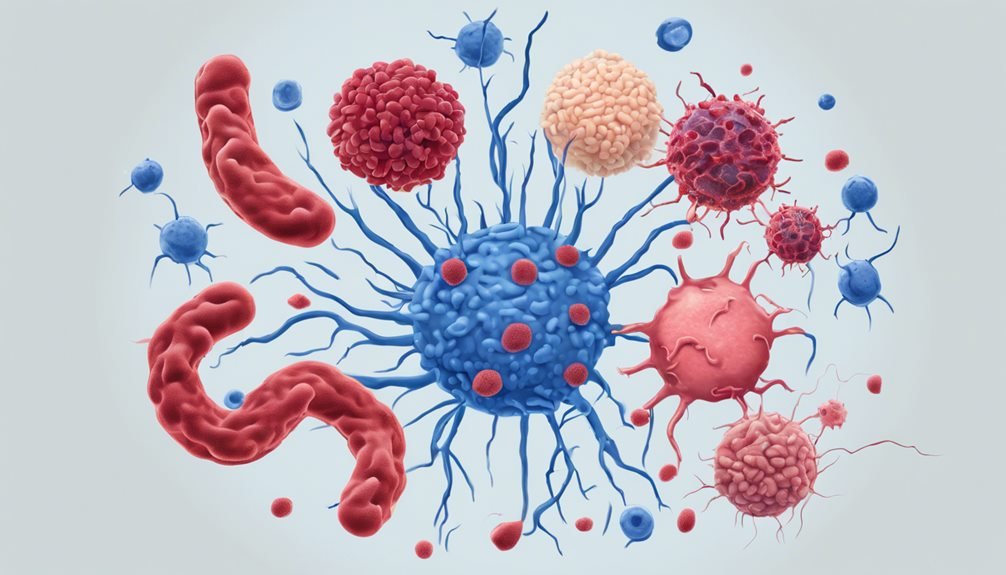
Exploring the intricate relationship between gut health and the risk of colorectal cancer reveals a compelling interplay between dietary habits, gut microbiota composition, and cancer development. When considering gut health and familial risk for colorectal cancer, the following points emerge:
- Dietary Choices Matter: Diets high in processed foods and low in fiber can increase the risk of colorectal cancer. Encouraging a balanced diet rich in fruits, vegetables, and whole grains can positively impact gut health.
- Family History: Individuals with a family history of colorectal cancer face a higher risk. Regular screenings and early detection can be crucial in managing this risk.
- Microbiome Interventions for Prevention: Emerging research suggests that interventions targeting the gut microbiome, such as probiotics and prebiotics, may play a role in preventing colorectal cancer by promoting a healthy gut environment.
- Lifestyle Modifications: Engaging in regular physical activity, maintaining a healthy weight, and avoiding smoking and excessive alcohol consumption can also contribute to reducing the risk of colorectal cancer.
Understanding these factors and taking proactive steps towards a healthier gut can significantly impact your risk of developing colorectal cancer.
Role of Probiotics in Cancer Prevention
Investigating the potential role of probiotics in cancer prevention unveils a complex landscape of interactions between beneficial gut bacteria and the body's defense mechanisms. Probiotic supplements, containing live beneficial bacteria, can influence the composition of gut flora, which plays a crucial role in maintaining a healthy immune system and preventing the growth of harmful bacteria. Research suggests that probiotics may enhance the body's ability to fight off cancer cells by modulating the immune response and reducing inflammation in the gut.
Studies have shown that certain probiotic strains can help in the prevention of colorectal cancer by promoting a balanced gut microbiome. These beneficial bacteria may inhibit the growth of tumor cells, reduce the production of harmful substances in the gut, and strengthen the intestinal barrier. By supporting a healthy gut environment, probiotics play a vital role in cancer prevention by improving immune function and reducing inflammation, highlighting the importance of maintaining a diverse and balanced gut microbiota for overall health.
Gut Health and Chemotherapy Efficacy
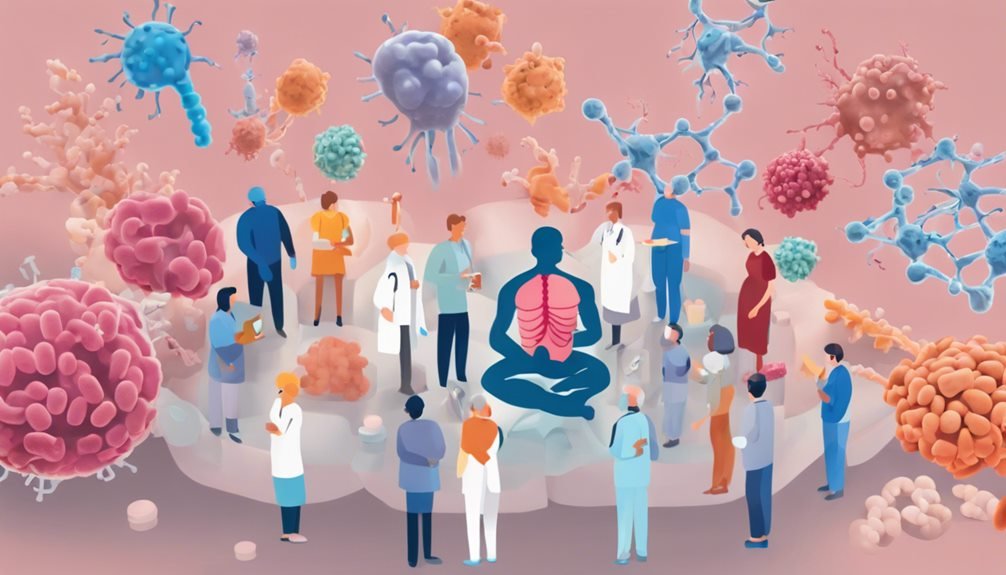
Understanding the intricate relationship between gut health and chemotherapy efficacy is paramount in optimizing cancer treatment outcomes. Gut bacteria play a crucial role in influencing the effectiveness of chemotherapy. Here's why this connection is so vital:
- Microbiome Diversity: A diverse gut microbiome can enhance chemotherapy outcomes by improving drug metabolism and reducing side effects.
- Immune System Modulation: Gut bacteria can interact with the immune system, potentially enhancing the body's response to chemotherapy and improving overall treatment efficacy.
- Drug Metabolism: Certain gut bacteria can metabolize chemotherapy drugs, affecting their bioavailability and efficacy in targeting cancer cells.
- Inflammation Regulation: Imbalanced gut bacteria can lead to chronic inflammation, which may impact chemotherapy effectiveness and overall treatment success.
Gut Microbiota and Cancer Treatment Side Effects
Considering the significant impact gut microbiota can have on chemotherapy efficacy, it's imperative to delve into the realm of how these gut bacteria influence the side effects experienced during cancer treatment. Research shows that gut microbiota play a crucial role in mediating the side effects of chemotherapy. Certain bacteria can metabolize drugs, affecting their efficacy and toxicity. For example, some gut microbes can activate or deactivate chemotherapy drugs, altering their impact on the body.
Moreover, gut health and immunotherapy outcomes are closely linked. The composition of gut microbiota can influence the body's immune response to immunotherapy treatments. Studies suggest that specific bacteria in the gut can enhance the effectiveness of immunotherapy, leading to better treatment outcomes for cancer patients. On the other hand, an imbalance in gut microbiota may reduce the efficacy of immunotherapy and increase the risk of adverse effects.
Understanding the intricate relationship between gut microbiota and cancer treatment side effects is essential for optimizing patient care and treatment strategies in oncology. By focusing on promoting a healthy gut microbiome, healthcare providers can potentially improve treatment outcomes and reduce the burden of side effects for cancer patients.
Dietary Impact on Gut Health and Cancer

How does your dietary choices impact the health of your gut and its potential connection to cancer development and progression? Your diet plays a crucial role in maintaining a healthy gut flora, which in turn can influence cancer prevention. Here are four key ways your dietary choices can impact your gut health and cancer risk:
- Consumption of Fiber: Including a variety of fruits, vegetables, whole grains, and legumes in your diet can promote the growth of beneficial gut bacteria, which are essential for maintaining a healthy gut microbiota associated with lower cancer risk.
- Limiting Processed Foods: High intake of processed foods, sugar, and unhealthy fats can disrupt the balance of gut flora, potentially leading to inflammation and an increased risk of cancer development.
- Eating Probiotic-Rich Foods: Incorporating probiotic-rich foods like yogurt, kefir, and fermented vegetables can introduce beneficial bacteria into your gut, supporting a healthy gut microbiome and aiding in cancer prevention.
- Hydration: Staying hydrated by drinking an adequate amount of water is essential for maintaining a healthy gut lining and supporting the growth of beneficial bacteria, which can contribute to a reduced risk of cancer.
Future Directions in Gut-Cancer Research
Research in the field of gut-cancer connections continues to evolve rapidly, with a focus on exploring novel avenues for understanding the intricate relationship between gut health and cancer development. One direction gaining momentum is the exploration of novel therapies that target the gut microbiota to prevent or treat cancer. These therapies aim to manipulate the composition of gut bacteria to enhance the body's immune response against cancer cells, potentially revolutionizing cancer treatment strategies.
Furthermore, emerging technologies, such as advanced sequencing techniques and bioinformatics tools, are being harnessed to delve deeper into the complex interplay between gut health and cancer. These technologies enable researchers to identify specific microbial signatures associated with cancer development, paving the way for personalized treatment approaches based on an individual's gut microbiome profile.
Frequently Asked Questions
Can Stress Affect the Gut Microbiome and Cancer Risk?
Yes, stress can indeed impact your gut microbiome and potentially increase cancer risk. Effective stress management techniques play a vital role in maintaining a healthy microbiome diversity, which is crucial for overall well-being. Chronic stress can disrupt the balance of beneficial bacteria in your gut, leading to inflammation and other harmful effects that may contribute to an increased risk of developing cancer. Prioritizing stress reduction strategies is essential for optimal gut health and cancer prevention.
How Does Age Impact Gut Health and Cancer Development?
As you age, your hormone levels naturally fluctuate, influencing your immune response and potentially impacting gut health. Hormone changes can affect the composition of your gut microbiome, which plays a crucial role in maintaining overall health. Additionally, as you grow older, your immune system may weaken, making you more susceptible to inflammation and oxidative stress, factors that can contribute to the development of cancer. Regular monitoring and maintenance of gut health are essential as you age.
Are There Specific Foods That Can Worsen Gut Permeability?
Certain foods can exacerbate gut inflammation and increase gut permeability, leading to issues like food sensitivities. Foods high in refined sugars, processed foods, and artificial additives are known culprits. These items can disrupt the delicate balance of your gut microbiome, causing inflammation and weakening the gut barrier.
Avoiding these foods and opting for whole, nutrient-dense options can help support gut health and reduce the risk of gut permeability-related issues.
Can Antibiotics Affect the Gut Microbiota and Cancer Treatment?
Yes, antibiotics can influence the gut microbiota and potentially impact cancer treatment outcomes. Research suggests that antibiotic use can reduce microbiome diversity, which may affect the efficacy of cancer therapies.
To counteract this, probiotic supplementation could help restore a balanced microbiota. Maintaining a diverse microbiome is crucial for overall health and may play a role in supporting cancer treatment effectiveness.
It's important to consider the potential impact of antibiotics on your gut health during cancer treatment.
Is There a Link Between Gut Health and Breast Cancer Risk?
When considering breast cancer risk, understanding the impact of gut health is vital. Diet significantly influences gut microbiota, affecting hormone balance crucial in breast cancer development. Maintaining a healthy gut through balanced nutrition can positively impact hormone levels, potentially reducing breast cancer risk.
Conclusion
In conclusion, maintaining optimal gut health is crucial in preventing cancer development. For example, a recent study found that colorectal cancer patients with a diverse gut microbiome had better treatment outcomes and lower recurrence rates. By supporting gut health through dietary changes and probiotics, individuals can reduce their cancer risk and improve their overall health. The link between gut health and cancer is a promising area of research that holds potential for innovative prevention and treatment strategies.




